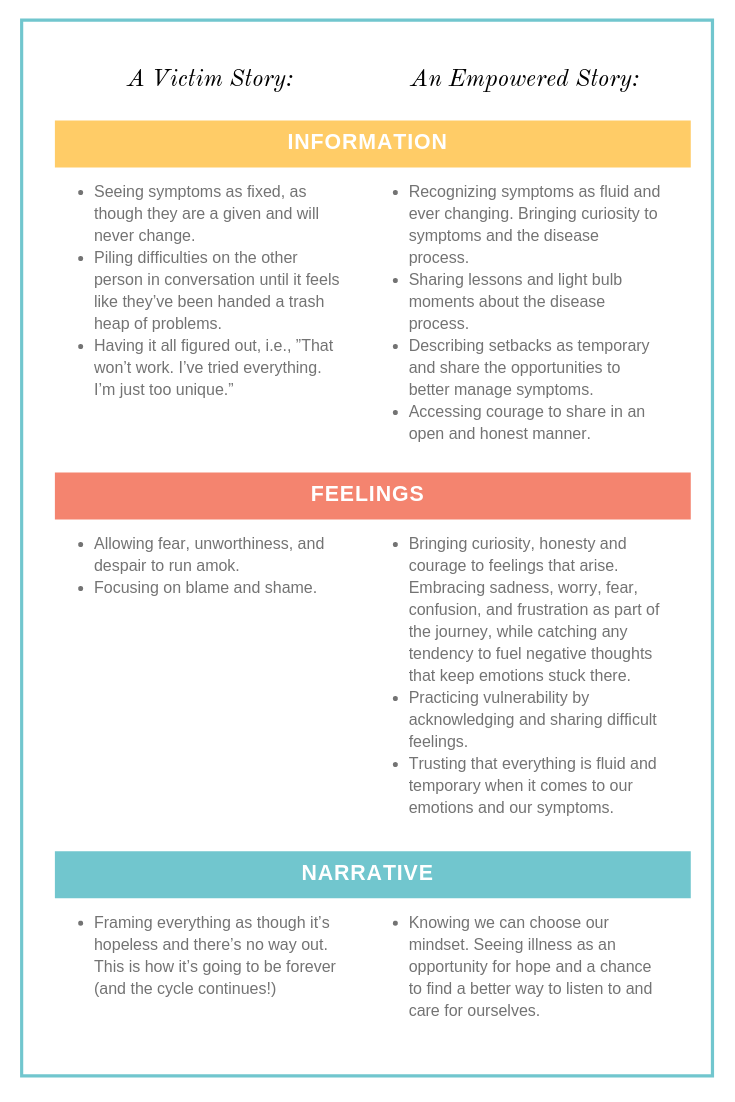
Every day, from the moment we wake up until our heads hit the pillow, we are immersed in stories and storytelling. They serve as a means to help us understand our circumstances and navigate our world. What we may not realize is the power behind our words. Narratives around disease can be intense and difficult—and I have come to believe that the stories we tell (both externally to others, and internally to ourselves) provide a structure and vocabulary that actually shape our reality. Our stories can give insight not only to our worldview, but also our approach to healing.
The ways we talk about disease can either build us up and inspire us, or they can keep us stuck and sick and sad. Untangling their power begins with looking at how (and whether) we tell them to others in the first place.
Approach #1: Silence Seems Safest
Many folks are shut down by shame, stuck in silence, and are committed to not taking up space by sharing with others, even though they may be telling a big story internally: “I’m so difficult, I must be so hard to be around, I’m never comfortable and everyone knows it, people don’t want to hear about my issues…” They don’t share their experiences out loud because they are afraid of irritating others by complaining.
The Upshot
The consequence of this behavior is that it’s incredibly isolating. My clients who follow this pattern report feeling resentful that no one understands them, and deeply lonely. When we wall ourselves off in this way, we also create the unintended consequence of keeping others shut off from the connection or inspiration they might have from hearing our story.
Approach #2: Talk About It, Talk About It, Talk About It
At the other end of the spectrum, I find that many folks share in a kind of “fire hose” method, like making sure everyone knows what they’re dealing with is a part time job. They are often coming from a place of despair, fear, scarcity, and hopelessness—and seeking connection through commiseration, or validation through sympathy. Often times, without even meaning to, people who take this approach end up in a cycle of trying to one-up the other folks they’re in conversation with and inadvertently hijacking the conversation. They can sometimes sound righteous in their suffering, describing every aspect of how uniquely sick they are.
The Upshot
I truly believe that folks who take this approach don’t fully appreciate its consequences. Specifically, that by hijacking the dialogue and talking endlessly about their disease, they are creating barriers to the connection they’re looking for. When we are so wrapped up in our narratives, we fail to show up in mutual connection with those around us.
What we tell others is a great insight into what we tell ourselves—and as we know, our inner dialogue becomes what we believe, and what we create. If we are telling ourselves a victim story, we are sabotaging our healing. If we tell ourselves a story that empowers, we better enable the body to heal itself. Let’s dive into the differences in our narratives.

Listen to yourself for a day. Are you telling stories of victimhood when it comes to your autoimmune disease, or empowerment? If you’re feeling really bold, ask a trusted friend to be an honest mirror for you—and be prepared that the answer may be tough to hear! If your stories are more on the victim side of the spectrum, here are some says to break that cycle.
The Secret Sauce: Vulnerability and Courage
I’m willing to bet that you know someone who is stuck in the victim narrative. (If you’re not sure, here’s a hint—you may cross the street when you see them coming because you don’t want to get stuck in their draining storytelling.) But changing the channel doesn’t mean you never get to talk about being scared, it just means that fear, scarcity, and unworthiness no longer get to run your every behavior and conversation. The price for admission to an empowered narrative? Vulnerability. There’s just no way around it.
Why vulnerability? Because the learning mindset behind an empowered narrative means first and foremost that you’re admitting that you don’t know everything. Think back to that friend who’s stuck—they’ve likely got an answer for every suggestion, a reason why every possible solution is a failure. They armor up with answers as a way of protecting themselves. But that kind of resignation also keeps them stuck in the spin cycle of the victim narrative. Vulnerability keeps us open to possibility and builds connection because it requires us to let go of or armor and protection and let others into our inner truth and honest experience.
Vulnerability, courage, and honesty breed connection.
Fear, scarcity and unworthiness breed disconnect and loneliness.
I encourage you to choose language consistent with moving toward opportunity and discovery versus language that defines you as sick and stuck. We get to choose what defines us by how we talk about it: illness and endless list of symptoms, or a journey of learning and discovery about our personal health.
There Is ALWAYS an Opportunity to Shift
One of the most maddening truths about autoimmune disease is that it is always changing. Symptoms are fluid, and while they can change for the worse seemingly at the drop of a hat, there is always a likelihood that they will improve, as well. I look at this as just another reason not to shackle yourself with a fixed mindset.
BONUS: How to Help A Friend Stuck In a Victim Story
It can be hard to know what questions to ask when you feel like a loved one is perpetuating their suffering with a victim story—be it their committed silence or unending complaining. Here are a few questions to keep in your back pocket that may help them access empowerment around their illness.
What are you experiencing lately related to [insert illness/health challenge here]?
Asking what they’re experiencing opens the door not just for a laundry list of symptoms, but for them to think about the emotions involved, as well. Challenge yourself to listen without trying to fix, solve, or need the difficulties to go away. Merely witness and listen.
How does that feel?
This one is the kicker for a lot of people who are armored up with answers. They may not be excited to lean into the vulnerability behind this question, but be patient and just listen. Help them put feelings to their experience by guiding them a little. “That sounds scary, or confusing, or frustrating, or overwhelming or scary….” Whatever you think they might be feeling, check it out with them.
How can I support you?
As much as we might want to, there is no way for us to solve our loved ones’ illness—and it wouldn’t be empowering for them if we were to try, anyway. This question asks them to powerfully reflect on what their needs are and it puts the ball in their court in a way that, “Is there anything I can do?” doesn’t. This question can keep them focused on hope, support, discovery, and connection. Give them ideas if they can’t think of anything hopeful or helpful.
Reflect back what you’re hearing.
If you have concerns, ask for permission to share feedback or concerns related to their process. Being an honest mirror is one of the most difficult ways to support a loved one with autoimmune disease, but it can be absolutely invaluable. Need a road map? Try this on for size:
“What I’m hearing is…
[insert symptom here] is what you are experiencing,
[emotion they’ve shared] is what you are feeling,
[request they’ve made] is the support you want…”
Or, “I’m worried that you aren’t reaching out for support or sharing your experience with people who care about you.” Or, “I notice that fear and scarcity come up a lot for you in your illness, and I can totally understand why. What is the impact of fear and scarcity on your health and quality of life?”
Follow up!
Now that you’ve created an honest space for sharing, don’t leave your loved one hanging. Keep creating the connection and conversation that makes you both feel supported.
Tapping into our power as storytellers to not just communicate our experience but create our reality is one of the most profound shifts I’ve worked on with my clients. I’d love to hear the stories you’re leaving behind in favor of those that support your wellness journey. Please, share in the comments!
















1 comment
I’m amazed and inspired by those people who are currently being diagnosed with a serious illness that have a positive mindset and striving for recovery rather than feeling down and hopeless.